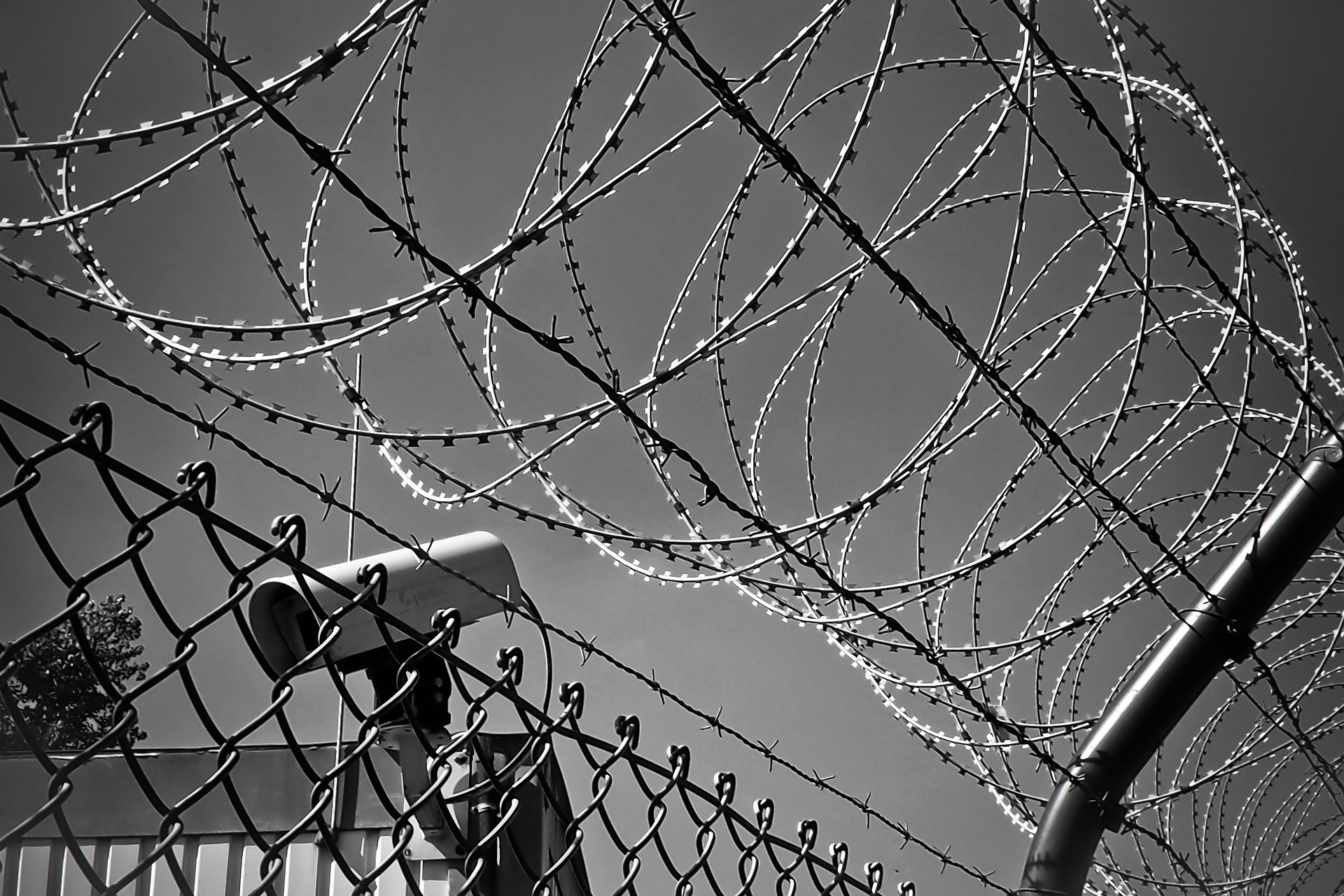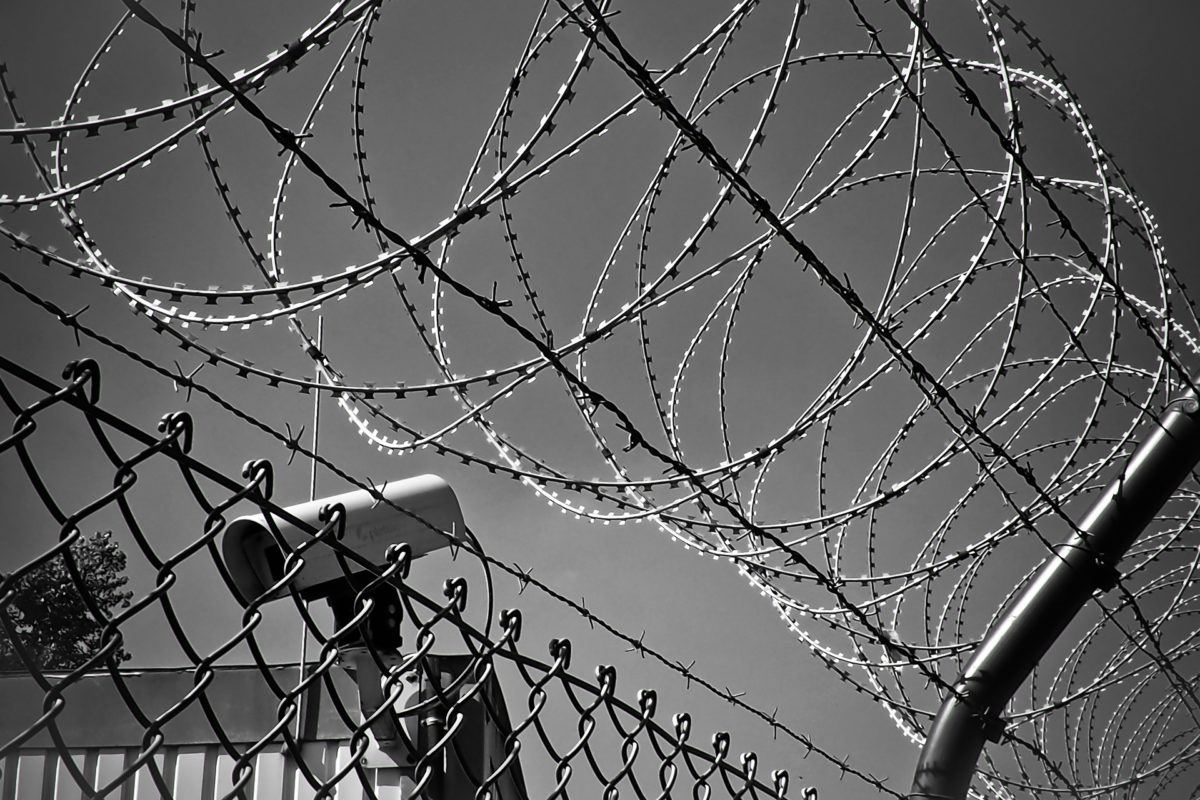Newsletter
Private Tech Surveillance Companies Are Taking Over Prisons
Barbed wire and a surveillance camera User 652243 via Pixabay Private Tech Surveillance Companies Are Taking Over Prisons by Nneka Ewulonu Incarcerated Americans are being watched like never before. Private American companies are rapidly digitizing prison mail. Some ankle-monitors can record whole conversations without people’s knowledge or consent. Most recently, at the end of last […]


Private Tech Surveillance Companies Are Taking Over Prisons
by Nneka Ewulonu
Incarcerated Americans are being watched like never before. Private American companies are rapidly digitizing prison mail. Some ankle-monitors can record whole conversations without people’s knowledge or consent. Most recently, at the end of last month, a group of American civil-rights organizations urged the federal government to crack down on the use of surveillance software called Verus, which transcribes imprisoned people’s phone-calls and scans the conversations for key phrases.
While all people have certainly become more surveilled since the advent of the digital and social-media ages, prisons have now become an unrestricted playground for technological advancements in monitoring and tracking tools. But relatively few people in power seem to be concerned about how such constant surveillance may impact the mental health and wellbeing of incarcerated people. Few studies have been conducted on the topic, but the data on the American prison-industrial complex that does exist suggests that affording incarcerated people a modicum of privacy can benefit society at large.
It may be easy to think incarcerated individuals should be constantly surveilled. Prison in its current form is a punishment, after all. But incarcerated Americans, no matter their crime, still have constitutionally protected rights—-rights that are threatened when the deprivation of freedom is coupled with the deprivation of privacy.
Ever since the 18th Century philosopher Jeremy Bentham developed what he called “the panopticon,” a building where a central figure could monitor the ongoings of an entire building, prisons have kept incarcerated individuals under strict monitoring. This reinforces a culture of fear and paranoia in modern facilities. Phone calls are tracked and recorded. Physical mail is scanned. Cameras and guards alike permeate the premises ready to catch and punish infractions, no matter how arbitrary or even discriminatory the consequences may be. To an incarcerated person, privacy is fantasy not found within the four walls of a prison cell.
But in the last decade or so, private technology companies have invented wholly new ways to invade the lives of imprisoned people. In 2015, Securus Technologies, which provides phone services for more than 3,000 correctional facilities across the U.S., was accused of recording at least 14,000 conversations between incarcerated individuals and attorneys over the course of almost three years. While it is unknown specifically how many of those conversations violated the right to attorney-client privilege, Securus paid out millions in settlements.
In 2019, The Appeal and The Intercept reported that U.S. prions are using artificial intelligence to create “voice prints” of incarcerated people. Separately, The Appeal also reported that year that officials in Chicago had been placing GPS ankle monitors on children that could call them and record their conversations without their consent. Privatizing and surveilling prison activities is big business for the companies that receive contracts: Jon Logan, the CEO of a firm called Smart Communications that takes physical mail, scans it, emails copies to people in prison, and creates searchable logs of mail communications, has become known online for Instagramming himself driving Lamborghinis and posing in luxury yachts. Imprisoned people, meanwhile, say that losing the ability to receive physical mail from loved ones—such as birthday cards or drawings from their children—can be devastating to their mental wellbeing.
In 2021, Reuters reported on a new artificial-intelligence tool that prisons are now using to track and record calls to imprisoned people. In eight states, AI tools were used to scan for mentions of the Spanish word for lawyer or complaints about COVID-19 outbreaks. In response, more than 40 civil-rights organizations, including the Electronic Frontier Foundation and the New York University Center on Race, Inequality, and the Law, last month urged government agencies to curtail the use of AI phone surveillance. In an open letter, the groups argued that the use of audio surveillance violates the constitutional rights of incarcerated people.
“Ultimately, this surveillance infringes the rights of incarcerated Americans, many of whom have not been convicted and are still working on their defenses, as well as those of their families, friends, and loved ones trying to stay connected and supportive, including minor children,” the letter stated.
If the civil rights of incarcerated individuals somehow isn’t enough, consider the downstream effects panopticonic prisons have. Surveillance is known to increase an individual’s feeling of stress, fatigue, and anxiety. Incarcerated individuals already experience serious mental illness at a rate two to four times higher than the general population, and few receive appropriate mental health care while incarcerated. A recent literature review suggests that incarcerated individuals frequently experience potentially traumatic events that are in turn strongly correlated with a future diagnosis of PTSD after release from prison. Keeping incarcerated people in a permanent state of heightened awareness, in addition to the overcrowding, solitary confinement, and lack of rehabilitative resources issues plaguing prisons, contributes to that individual’s inability to reintegrate with the general public upon release.
If prisons exist, they should at least achieve their alleged desired outcomes of rehabilitation and reintegration after release. Norway, for example, which reduced its recidivism rate from 70 percent to just 20 percent after adopting a set of humane principles in the 1990s centered around treating people with respect, educating them, and building positive communities inside prisons that resemble life on the outside.
Whether motivated by empathy or outcomes, our current treatment of incarcerated individuals is untenable. What the state does to those under its complete control will eventually expand beyond carceral contexts; the surveillance state is growing in almost every environment. Privacy is a right, and shouldn’t be extinguished even for those in prison.
Nneka Ewulonu (they/them) is a civil rights attorney based out of Atlanta, Georgia. All views contained in Nneka’s writing represent them alone and not their employer.
In the news
Contact us at newsletter@theappeal.org so we can feature your work here.
Demetrius Buckley has been in a Michigan maximum security prison since 2018, even though he was approved for a transfer in 2019. He and other incarcerated people are subjected to lockdowns multiple times a week and the constant threat of solitary confinement, which takes them off the transfer list. [Demetrius Buckley / Filter Mag]
New York Governor Kathy Hochul is proposing passing a constitutional amendment to overturn New York’s century-old ban on private employment of incarcerated people. Hochul’s proposal would allow the state to garnish up to 50 percent of incarcerated people’s wages. [Lauren Gill / New York Focus]
In his State of the Union, President Biden said we need to “fund the police,” not defund them. Congresswoman Cori Bush tweeted in response: “All our country has done is given more funding to police. The result? 2021 set a record for fatal police shootings. Defund the police. Invest in our communities.” [Ben Leonard / Politico]
Texas Governor Greg Abbott has directed the state’s child protective services agency to investigate families with transgender children who have received gender affirming healthcare, or in Abbott’s parlance, “sex change” procedures. Educators, members of the general public, and “licensed professionals who have direct contact with children” can face criminal penalties if they do not report such “child abuse,” according to his directive. Child protective services placed one of its own employees on leave and began an investigation into her family because she has a transgender daughter. The ACLU has filed suit to block the directive. [Melissa Gira Grant / The New Republic]
Pinal County Sheriff Mark Lamb told reporter Jessica Pishko that all visits at the county jail have been by video since around 2013 because, he said, “You just can’t risk people bringing stuff into the prison.” As Pishko writes, most banned items that are brought into prisons (which are not necessarily illegal outside the prison walls, like a cell phone) are brought in by jail employees. [Jessica Pishko / Posse Comitatus]
That’s all for this week. Feel free to leave us some feedback, and if you want to support our official relaunch, please donate here. Until next time, the work continues.
